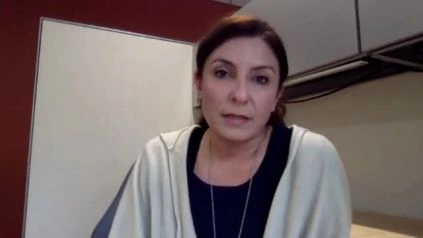Christine Brown, Ph.D. Deputy Director, T Cell Therapeutics Research Laboratory; Professor, Departments of Hematology and Hematopoietic Cell Transplantation and Immuno-Oncology and Darya Alizadeh, Ph.D. assistant research professor in the Department of Hematology & Hematopoietic Cell Transplantation at speaks about AACR 2021 Abstract – CAR T Cell Therapy Reshapes Tumor Microenvironment In Glioblastoma.
Link to Abstract:
https://www.abstractsonline.com/pp8/#!/9325/presentation/1124
Summary
CAR T cell therapy is gaining traction as a promising cancer treatment choice, with the potential to open up new therapeutic possibilities for people with glioblastoma (GBM) and other solid tumors. Although early clinical trials of CAR T cell therapy in GBM have shown that it is safe and efficient, objective clinical outcomes have been limited. It’s still uncertain if effective CAR T cell therapy for solid tumors involves only CAR T cell interaction with tumor antigen or even the activation of the patient’s own immune system. We set out to mechanistically interrogate the interplay between CAR T cell therapy and the host tumor microenvironment, focusing on our preclinical and clinical program evaluating IL13R2-targeted CAR-T cells for the treatment of IL13R2-positive glioblastoma (GBM). In immunocompetent C57BL/6 mice, we developed a murine CAR T cell syngeneic platform and demonstrated that a single intratumoral infusion of IL13R2-CAR T cells mediates potent antitumor activity against existing KR158 tumors, a highly invasive and poorly immunogenic murine glioma model. We show that CAR T cell treatment of syngeneic GBM in mice changes the tumor immune environment, activates intratumoral myeloid cells, and induces endogenous T cell memory responses, all while allowing CAR T responses to feed forward. IFN development by CAR T cells and IFN responsiveness of host immune cells are both essential for tumor immune landscape remodeling, which promotes a more activated and less suppressive tumor microenvironment. Patient samples from our ongoing IL13R2-CAR T cell phase I clinical trial [NCT02208362] were used to investigate the clinical validity of these results. We show that locoregional CAR T cell infusions cause a spike in inflammatory cytokines and an influx of endogenous immune cells into the cerebrospinal fluid (CSF) and resected tumor cavity, which is consistent with our preclinical findings. Specific genes were upregulated in immune cells from blood and CSF samples after treatment, according to single-cell RNA sequencing. Despite heterogeneous IL13R2 tumor expression, one patient who presented with recurrent multifocal GBM achieved a remarkable complete response (CR) following locoregional delivery of IL13R2-CAR T cells (PMID: 28029927). Following IL13R2-targeted CAR T therapy, we now see the induction of endogenous tumor-specific T cell reactivity and T cell clones whose dynamics contracted with tumor volume in this responding patient. These findings show that CAR T cell therapy has the ability to reshape the tumor microenvironment, allowing for the elicitation of endogenous antitumor immunity. They also highlight the importance of the host’s innate and adaptive immunity in effective CAR T cell therapy for solid tumors.

